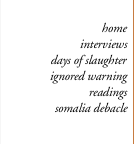 |
 | 
 |


Philip Gourevitch began visiting Rwanda in May of 1995 as a reporter on
assignment for The New Yorker. It was just one year after the genocide,
in which the Rwandan government had called on everyone in the country's Hutu
majority group (85% of the population) to join together and murder everyone in
the Tutsi minority group (15%). Though the massacres were low-tech--done
largely by machete--they were carried out at dazzling speed, and 800,000
people were killed in just a hundred days. Gourevitch felt compelled to
understand how this extraordinary crime had come to pass, how it was organized,
how the great Western powers had stood by and watched it happen, and--most of
all--how Rwandans were living with its legacy. Over the next two and a half
years, Gourevitch returned to central Africa for six different reporting trips,
spending a total of nine months in Rwanda and in its neighbor, the Congo
(formerly Zaire). In 1998, his book, We Wish To
Inform You That Tomorrow We Will Be Killed With Our Families was published by
Farrar, Straus & Giroux.
 |  |  |
 |
home .
interviews .
100 days of slaughter .
readings .
somalia debacle .
ignored warning
discussion .
synopsis .
press .
tapes & transcripts
frontline online .
pbs online
web site copyright WGBH educational foundation
|